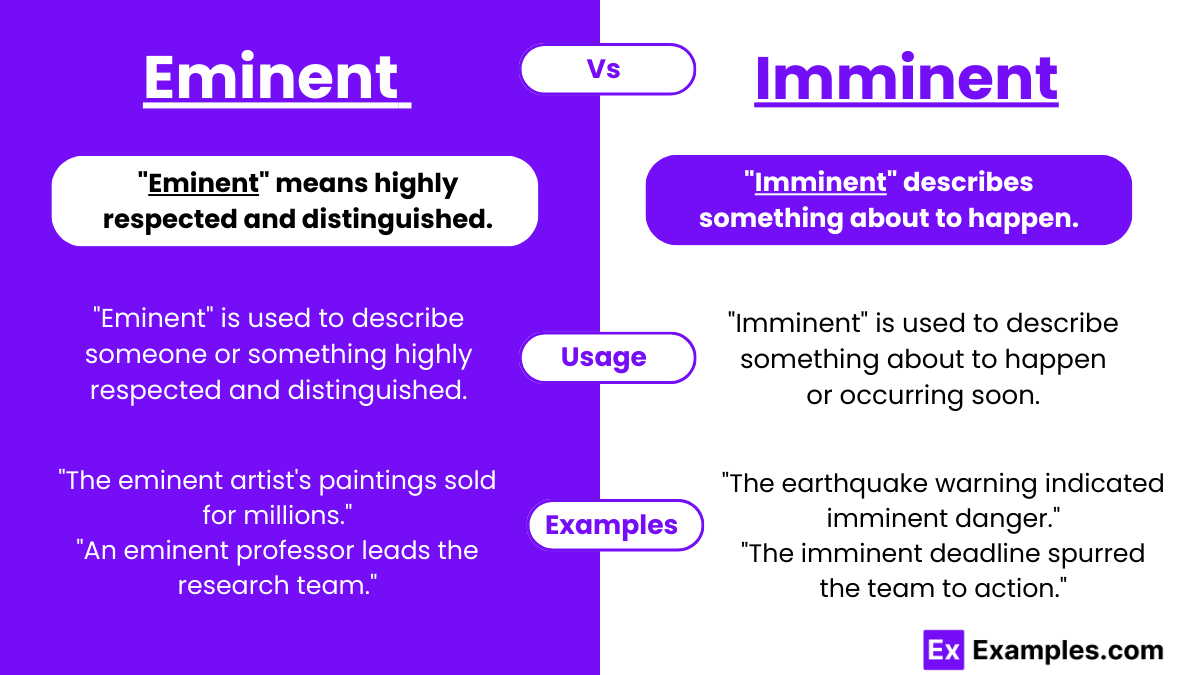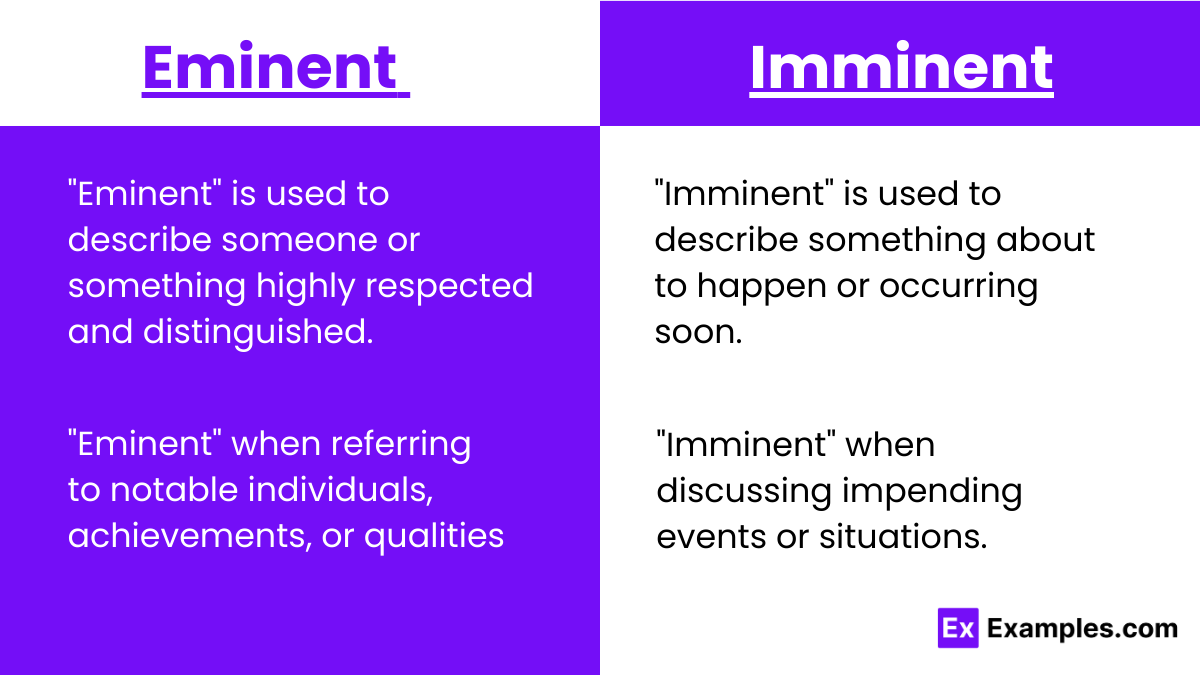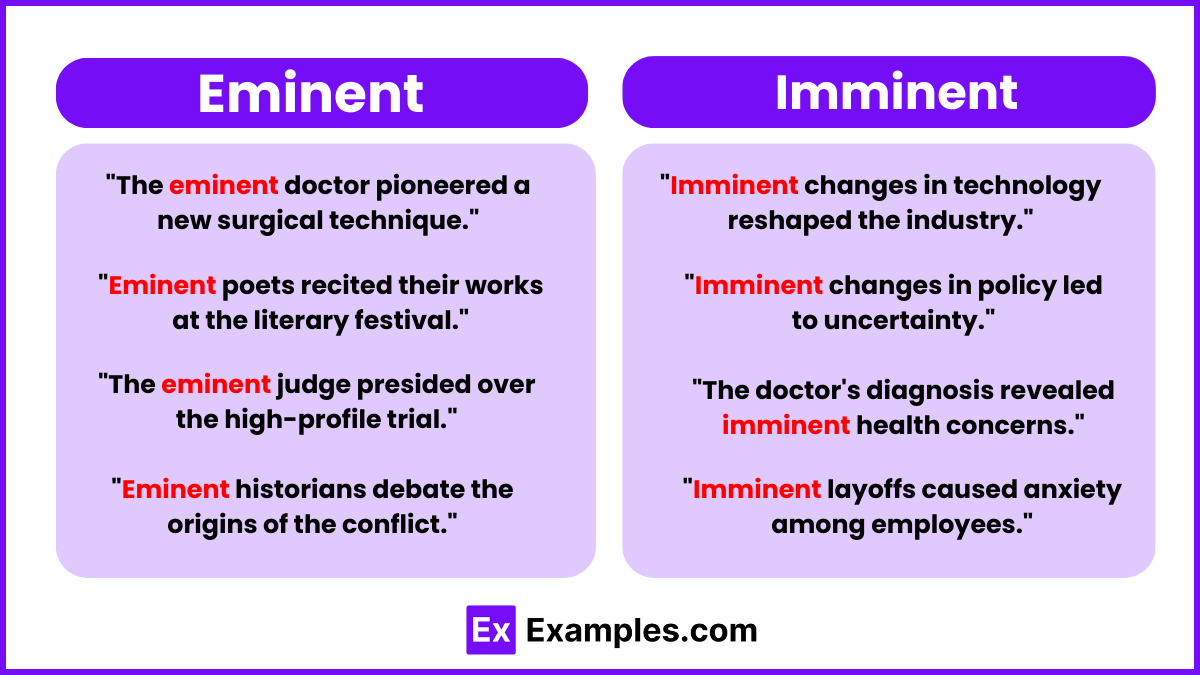Eminent vs Imminent – Examples, Differences, Usage, Tricks, PDF
In the world of English vocabulary, the subtle distinction between the adjectives “eminent” and “imminent” often leads to a mix-up, despite their markedly different meanings. This confusion primarily stems from their strikingly similar pronunciation, differentiated by merely a single vowel sound. These words, while sounding almost identical, open up entirely different realms of description. Eminent is typically reserved for individuals or entities that exhibit an exceptional level of prominence or distinction, setting them apart from the rest. On the other hand, imminent serves to signal the near occurrence of an event, emphasizing its looming presence on the horizon.
Understanding these terms is crucial, especially for students who are honing their linguistic skills and expanding their academic vocabulary. The distinction is not just a matter of semantics but of context and usage that can significantly alter the meaning of a sentence. While “eminent” shines a light on superiority and notable standing, “imminent” casts a shadow of anticipation, often tinged with urgency or foreboding. This introductory exploration into the nuanced differences between “eminent” and “imminent” serves as a cornerstone for students and enthusiasts alike, eager to navigate the intricate pathways of the English language with precision and clarity.
“Eminent” and “Imminent” – Meanings
Eminent: Eminent refers to a person or entity that is distinguished, prominent, and highly respected within a specific sphere or field. This term is often used to describe individuals who have achieved remarkable accomplishments or possess outstanding qualities that set them apart from others. An eminent person is not only recognized for their excellence but also holds a position of authority or influence, often inspiring admiration and respect from peers and the public alike.
Imminent: Imminent, on the other hand, describes something that is about to happen or is on the verge of occurring. It conveys a sense of immediacy and urgency, suggesting that an event or situation is looming and inevitable. The term is often used in contexts where there is anticipation or concern about what is to come, highlighting the nearness in time of the expected occurrence. Imminent is not tied to any particular outcome, so it can refer to both positive and negative events.
Summary
The distinction between “imminent” and “eminent” is subtle, marked only by a slight variation in vowel sound, leading to their frequent confusion. “Eminent” characterizes individuals or entities that conspicuously excel or surpass others, highlighting their notable prominence. Conversely, “imminent” pertains to events or occurrences poised to take place in the near future, emphasizing their approaching nature. Additionally, the term “immanent,” despite sharing pronunciation with “imminent,” carries a different meaning, referring to something that exists inherently within the realm of understanding or experience.
How To Pronounce Eminent and Imminent
Pronouncing “eminent” and “imminent” correctly is key to distinguishing between these two words, despite their close resemblance in sound. Here’s a breakdown of each pronunciation:
- Eminent: Pronounced as /ˈɛmɪnənt/, the word begins with the “eh” sound, similar to the “e” in “pet” or “end.” The middle syllable is a short “i” sound, as in “sit” or “hit,” followed by a soft “n” sound. The last syllable is pronounced with a muted “ənt,” often sounding like “nunt” in casual speech.
- Imminent: Pronounced as /ˈɪmɪnənt/, this word starts with the “ih” sound, akin to the “i” in “bit” or “win.” The pronunciation of the middle and ending syllables is the same as in “eminent,” with a short “i” followed by a soft “n” sound and ending in “nunt.”
Difference Between Eminent and Imminent
Exploring the contrast between “eminent” and “imminent” reveals their unique applications and meanings in the English language.
| Aspect | Eminent | Imminent |
|---|---|---|
| Definition | Distinguished and highly respected | About to happen or occur |
| Context | Describes individuals or qualities | Pertains to events or situations |
| Usage | To highlight prominence or distinction | To indicate immediate approach or likelihood |
| Connotation | Positive, often related to achievement or status | Neutral or urgent, depending on the context |
| Field | Commonly used in academic, professional settings | Broad usage across various contexts |
| Synonyms | Renowned, illustrious, distinguished | Approaching, forthcoming, looming |
| Antonyms | Obscure, unknown, unremarkable | Distant, remote, unlikely |
| Derivatives | Eminence (noun) | Imminence (noun) |
| Examples | An eminent scientist | Rain is imminent |
| Pronunciation | /ˈɛmɪnənt/ | /ˈɪmɪnənt/ |
Tricks to Remember Eminent and Imminent
Mastering the distinction between “eminent” and “imminent” can be simplified with these mnemonic tricks and tips:
- Eminent Echoes Excellence: “E” in eminent for “excellence” and “eminence.”
- Imminent Implies Immediate: “Im” in imminent for “immediate” occurrence.
- Eminent for Esteem: Remember “eminent” with esteem, both start with “E.”
- Imminent and Incoming: Link “im” in imminent to “incoming” events.
- E for Elevation: Eminent involves elevation in status, starting with “E.”
- I for Impending: Imminent is for impending events, both starting with “I.”
- Prominence with Eminent: Associate “eminent” with prominent people or traits.
- Imminent and Impending: “Imminent” for situations that are impending or about to occur.
- Visual Cue: Visualize an eminent person standing on a podium, elevating them.
- Context Clue: Use sentence context; eminent rarely applies to events, while imminent does.
When to use Eminent and Imminent
Understanding when to use “eminent” versus “imminent” is crucial for precise communication. Here are some guidelines:
-
Usage of “Eminent”:
- To describe a person of high rank or achievements.
- When referring to something or someone that stands out in a field.
- In contexts highlighting respect and admiration.
- For entities known for their distinguished contributions.
-
Usage of “Imminent”:
- To indicate something is about to happen.
- In situations conveying a sense of urgency.
- When describing events that are looming or forthcoming.
- For circumstances where timing is a critical factor.
How to Use Eminent and Imminent
the use of “eminent” and “imminent” enhances clarity in communication. Here’s how to employ each word effectively:
- Eminent:
- To characterize individuals renowned for their expertise or contributions: “The panel included eminent scholars from around the world.”
- When highlighting the exceptional quality or status of something: “The museum housed works by eminent artists.”
- In describing someone who commands respect due to their position or achievements: “She was an eminent figure in the field of biochemistry.”
- Imminent:
- For situations where an event is expected to occur very soon: “Meteorologists warned that the storm was imminent.”
- When there’s a sense of impending action or outcome: “The tension in the room made the announcement seem imminent.”
- In expressing the immediate threat or likelihood of something happening: “With dark clouds gathering, rain seemed imminent.”
Eminent and Imminent – Examples
Eminent Examples:
- The award was given to an eminent novelist known for her impactful storytelling.
- He studied under the guidance of an eminent professor in quantum physics.
- The conference attracted eminent scientists from various fields.
- She is recognized as an eminent authority on constitutional law.
- The documentary featured interviews with eminent historians.
Imminent Examples:
- The darkening skies suggested that a storm was imminent.
- Due to the rising tensions, a resolution seemed imminent.
- The CEO announced that changes in the company were imminent.
- Given the circumstances, his resignation appeared imminent.
- The forecast warned of imminent heavy rainfall in the area
Synonyms For Eminent and Imminent
Here’s a table of synonyms for “eminent” and “imminent” to enhance your vocabulary:
| Eminent | Imminent |
|---|---|
| Distinguished | Approaching |
| Renowned | Pending |
| Illustrious | Looming |
| Prestigious | Near |
| Notable | Forthcoming |
| Esteemed | Impending |
| Prominent | Close at hand |
| Celebrated | On the horizon |
| Reputable | Brewing |
| Exalted | About to happen |
Exercise
Fill in the blank with the correct form of “Eminent and Imminent”:
- The arrival of the guest speaker, an ____________ expert in renewable energy, is highly anticipated.
- With the storm clouds gathering, heavy rain seems ____________.
- She is an ____________ figure in the field of modern art.
- The ____________ launch of the new software update has the tech community buzzing.
- His contributions to science made him one of the most ____________ researchers of his time.
- Given the recent warnings, a volcanic eruption is ____________.
- The ____________ architect was commissioned to design the new city hall.
- The possibility of a strike by the workers is ____________.
- In the realm of classical music, she is considered an ____________ performer.
- With negotiations breaking down, a shutdown seems ____________
FAQs
Is it Imminent or Eminent Danger?
Imminent danger refers to a threat that is about to occur, emphasizing the immediate risk. Eminent, however, is unrelated to threats and denotes high stature or prominence.
Can You Say Something is Imminent?
Yes, you can describe an event as imminent when it’s expected to happen very soon, indicating its nearness in time or the high likelihood of its occurrence.
Is Imminent a Positive Word?
Imminent is neutral, describing the nearness of events without a positive or negative connotation. Its positivity or negativity depends on the context in which it’s used.




